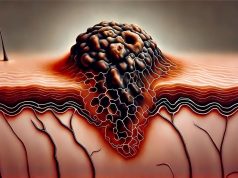L858R mutation in tumor tissue or cfDNA is marker of shorter overall, progression-free survival
MONDAY, March 2, 2015 (HealthDay News) — For patients with non-small-cell lung cancer (NSCLC) with epidermal growth factor receptor (EGFR) mutations, the L858R mutation in circulating free DNA (cfDNA) seems to be a prognostic marker, according to a study published online Feb. 26 in JAMA Oncology.
Niki Karachaliou, M.D., from the Quiron-Dexeus University Hospital in Barcelona, Spain, and colleagues examined the feasibility of using cfDNA from blood samples as a surrogate for tumor biopsy for determining EGFR mutation status. The analysis was a secondary objective of the EURTAC trial, involving patients with advanced NSCLC, oncogenic EGFR mutations in the tumor, and no prior chemotherapy for metastatic disease. EGFR mutations were examined in cfDNA isolated from 97 baseline blood samples.
The researchers detected EGFR mutations in samples from 76 patients with usable blood samples. In patients with the L858R mutation in cfDNA, median overall survival was shorter compared to those with the exon 19 deletion (13.7 versus 30.0 months; P < 0.001). The L858R mutation was identified as a marker of shorter overall survival and progression-free survival in tumor tissue or in cfDNA (hazard ratios, 2.70 and 2.04, respectively), in univariate analyses. For patients with the L858R mutation in tissue, the median overall survival was shorter for patients with the L858R mutation in cfDNA versus those in whom the mutation was not detected in cfDNA (13.7 versus 27.7 months; P = 0.03).
“The L858R mutation in cfDNA may be a novel surrogate prognostic marker,” the authors write.
Copyright © 2015 HealthDay. All rights reserved.








